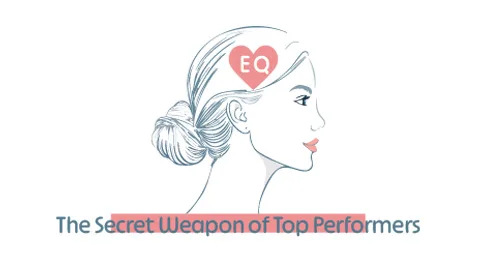
Emotional Intelligence: The Secret Weapon of Top Performers
Do you know what sets top performers apart in the workplace? Discover how mastering EQ can transform your leadership, collaboration, and overall career success.
When I first started my career, I poured everything into proving myself—working long hours, hitting targets, and pushing myself beyond limits. I believed success was about skill, effort, and timing. If I could just master my craft, I’d be recognized. But despite all that effort, something always felt off. Fulfillment and being truly seen seemed out of reach.
I thought it was about being in the right place at the right time, or maybe I was missing something others had. What I couldn’t see was that beneath the feeling of being stuck was something deeper—emotional intelligence, or rather, my lack of it. I had the technical skills but wasn’t managing my own emotions or understanding those around me. That was the missing piece.
What is Emotional Intelligence (EQ)?
At its core, emotional intelligence (EQ) is the ability to recognize, understand, and manage our emotions, while also being able to recognize and influence the emotions of others. Daniel Goleman, a leading expert on emotional intelligence, has broken EQ into five key components:
- Self-awareness – Knowing your emotions and their impact.
- Self-regulation – Managing or redirecting disruptive emotions and impulses.
- Motivation – Using emotions to pursue goals with energy and persistence.
- Empathy – Understanding the emotional makeup of others.
- Social Skills – Building rapport and managing relationships effectively.
When I was early in my career, I hadn’t heard much about emotional intelligence. I had a limited understanding of the importance of emotional awareness in the workplace. I focused solely on getting things done, working harder, and mastering my role. But I was overlooking a fundamental truth: how we feel and how we manage our emotions directly impacts our ability to lead, collaborate, and thrive professionally.
Why EQ Matters in the Workplace
Whether you’re a leader, a team member, or a collaborator, your emotional intelligence directly influences how well you connect with others and how you handle the pressures of work. Research has shown that EQ is one of the most important predictors of success in the workplace.
In a study by TalentSmart, 90% of top performers were found to have high EQ, while just 20% of low performers had similar levels of emotional intelligence. This finding underscores the importance of emotional intelligence in achieving success. Being able to manage stress, stay calm under pressure, and communicate effectively are crucial traits for high performers.
Let’s take a closer look at how emotional intelligence plays a role in two key workplace areas: leadership and collaboration.
Emotional Intelligence and Leadership
Leadership isn’t just about giving directions or being in charge. It’s about inspiring, motivating, and understanding your team. Leaders with high emotional intelligence are able to foster an environment of trust and respect.
For example, studies have shown that leaders who demonstrate empathy—understanding their employees’ emotions and perspectives—have more engaged and productive teams. In fact, a report by the Center for Creative Leadership found that emotionally intelligent leaders are more successful in creating a positive organizational culture and are better at conflict resolution.
When I started to embrace emotional intelligence, I noticed how much my leadership style improved. I began to listen more, understand the emotions driving my team, and communicate more effectively. Instead of just focusing on tasks, I started thinking about how to support my team members emotionally. That shift made all the difference. My team was more engaged, motivated, and productive, and the overall atmosphere improved.
Emotional Intelligence and Collaboration
Great collaboration requires more than just technical skills. It requires a delicate balance of empathy, communication, and adaptability. People with high EQ are excellent collaborators because they’re in tune with their emotions and the emotions of others.
One of the most important traits of an emotionally intelligent collaborator is the ability to listen actively. Active listening goes beyond hearing words; it involves tuning into the emotions and underlying needs of others. A study conducted by the Harvard Business Review found that teams who communicate openly and understand each other’s emotional needs are more effective and innovative.
People with high EQ also know how to adapt to others. They are flexible and adjust their approach based on the emotions and perspectives of their colleagues. This adaptability helps maintain harmony and prevent conflict. As a result, collaboration becomes smoother, and ideas flow more freely.
Effective collaboration also involves knowing how to manage conflict. Disagreements are natural in any workplace, but emotionally intelligent people know how to resolve conflicts without escalating them. Instead of reacting defensively or shutting down, they use empathy and communication skills to resolve misunderstandings and find solutions.
The Science Behind Emotional Intelligence
The importance of EQ is supported by research from neuroscience. Studies have shown that emotional intelligence can actually change the structure of our brains. In a 2012 study, scientists at the University of California found that people with higher emotional intelligence had more gray matter in the prefrontal cortex, the area of the brain associated with decision-making, social behavior, and impulse control.
Furthermore, emotionally intelligent people are better at managing their stress levels. Chronic stress can have detrimental effects on the brain, impairing cognitive function and decision-making abilities. High EQ allows individuals to regulate their emotions, which helps them manage stress and remain focused on their goals.
How to Cultivate Emotional Intelligence
The good news is that emotional intelligence isn’t fixed—it’s a skill you can develop. Here are a few practical steps to enhance your EQ at work:
- Practice self-awareness: Pay attention to your emotional triggers and how they affect your decisions. Journaling or meditating can help you reflect on your emotions.
- Seek feedback: Ask trusted colleagues how they perceive your emotional responses and interpersonal skills. Use their insights to adjust your approach.
- Develop empathy: Make an effort to understand the perspectives of others. When someone expresses frustration or joy, try to see things from their viewpoint.
- Manage stress: Practice techniques like mindfulness, deep breathing, or physical activity to help you regulate emotions, especially in stressful situations.
- Improve your social skills: Work on being more approachable, creating rapport with others, and practicing positive body language.
Real-Life Example: How EQ Changed My Career
I remember a time when a particularly challenging project almost derailed my progress. The team was divided, tension was high, and I could feel the stress weighing on everyone. But instead of reacting in frustration or demanding results, I took a step back and focused on understanding the emotional landscape. I addressed the team’s concerns, listened actively to their feelings, and encouraged open communication. Slowly, the team began to collaborate more effectively, and we finished the project ahead of schedule.
That experience taught me that emotional intelligence is not just a soft skill—it’s a powerful tool that can make or break a project, a relationship, or even a career.
EQ is Essential for Success
I want to tell you: mastering emotional intelligence is such a game-changer! It’s not just about what you do but how you do it, and EQ can give you the edge in ways you might not even realize yet. You’re already on the right track by recognizing the importance of it. You’re taking the first step towards leveling up your career, and trust me, that journey will not only impact your work but also your life in ways you won’t regret.
Imagine the connections you’ll make, the way you’ll influence and inspire others, and how much smoother your leadership and collaborations will be. It’s all in your hands, and with each small step, you’re getting closer to a level of success that goes beyond skill—one that truly resonates with who you are and what you stand for.
You’ve got what it takes. Stay patient with yourself, keep showing up, and focus on the progress you’re making. I’m rooting for you every step of the way. Here’s to an incredible career, full of growth, connection, and endless opportunities. You’ve got this!




